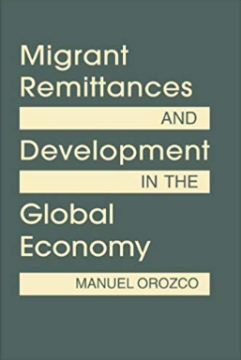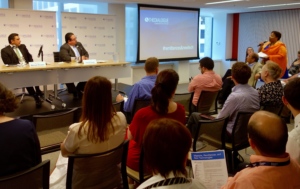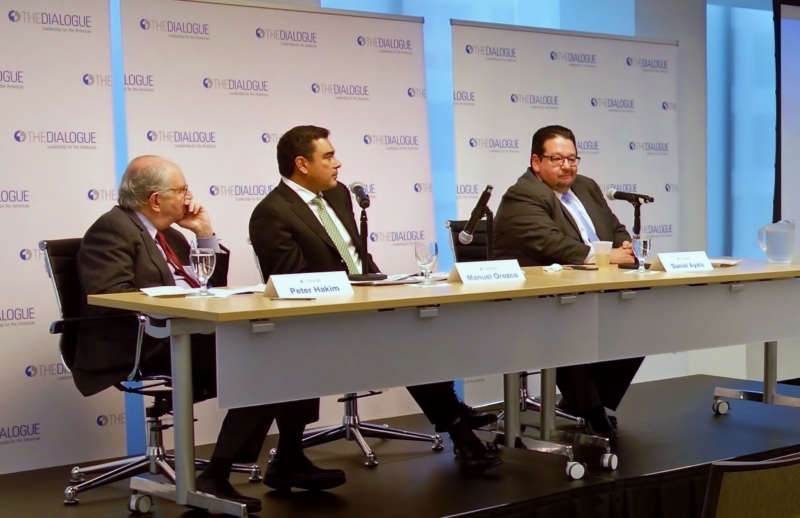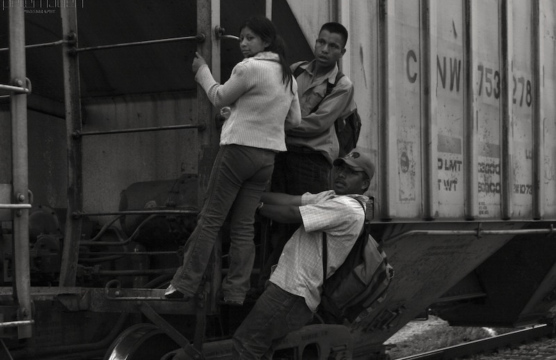
Migrant Remittances & Development in the Global Economy
How do patterns of migration and remittances differ across regions? What kinds of frameworks support the contributions of remittances to local development?
Remittances to Latin America and the Caribbean surpassed US$70 billion in 2016, representing a critical source of income for the region. Two new Dialogue studies shed light on remittances, emerging technologies in methods of transfers, and opportunities for financial inclusion. These studies were presented and discussed on Wednesday May 17th at an event moderated by Peter Hakim, President Emeritus of the Dialogue, and featuring speakers Manuel Orozco, the Director of the Dialogue’s Migration, Remittances, and Development Program, and Daniel Ayala, the Executive Vice President and Head of Global Remittances Services for Wells Fargo. Other RIO members and industry leaders were present to participate in the discussion.
Orozco presented the findings of the Dialogue’s two new remittance studies: 1) On the Cusp of Change: Migrants’ use of the internet for remittance transfers, and 2) Internet-Based Transfers: Current Landscape.
Both studies note an increase in internet-based and mobile transfer services. Ten years ago, 0% of remitters from the US to Latin America and the Caribbean were using internet-based transfer services and now 6% are using such services. There is a greater disposition today to switch from cash-to-cash transfers to online services, especially mobile services. Additionally, financial inclusion has increased for migrants in the US. Today, approximately two thirds of migrants have a bank account whereas 15 years ago, only 29% reported having a bank account. This is due in large part to the fact that migrants are staying longer in the US. Migrants are also using a greater number of financial services in general, which does not depend on their use of a formal bank account as many financial services are offered by businesses and retailers that are not formal banks. Finally, the reports illustrate that the movement towards internet and mobile transfers is not a linear process. There are obstacles to technology adoption that may be addressed with financial education and other strategies.
Ayala discussed in more detail the changes that have occurred over the years in financial inclusion of migrants and increased use of online services. He mentioned that positive impacts include the proliferation of financial technology companies and the lower transaction costs that come with online services. Additionally, the Consumer Financial Protection Bureau (CFPB) has been beneficial in that it standardized the way remittance transfer services are presented to customers to make it easier for users to understand what they are being offered. Ayala also praised the two studies under discussion saying that this type of research encourages banks and financial service providers to find ways to “penetrate further into the needs of these customers [migrants].”
The event highlighted the importance of improving financial education to increase the financial access of migrants, strengthen their knowledge and confidence of product and service usage, and their use of internet-based services to send remittances. This will ultimately make it possible to go the “last mile” to harness the full potential of remittances.
[caption id="attachment_62162" align="alignright" width="326"] Manuel Orozco / Daniel Ayala / Photo by Julia Yansura / Inter-American Dialogue[/caption]
Manuel Orozco / Daniel Ayala / Photo by Julia Yansura / Inter-American Dialogue[/caption]
Numerous questions were posed by the audience related to how the full potential of remittances can be harnessed in Latin America and the Caribbean. Orozco emphasized the need for more targeted financial education for migrants on issues such as managing transnational households, migrant economic rights, and usage of the variety of products and services offered. The families receiving remittances can also benefit from financial education on budgeting and saving. Ayala commented that there is still a “last mile” to be reached where remittances are not just a form of support to household income, but rather that remittances are used to invest in development such as education of younger family members. Countries such as the Philippines provide a good model. This is where fintechs and financial education programs need to focus their attention, according to Ayala.
Ayala discussed in more detail the changes that have occurred over the years in financial inclusion of migrants and increased use of online services. He mentioned that positive impacts include the proliferation of financial technology companies and the lower transaction costs that come with online services. Additionally, the Consumer Financial Protection Bureau (CFPB) has been beneficial in that it standardized the way remittance transfer services are presented to customers to make it easier for users to understand what they are being offered. Ayala also praised the two studies under discussion saying that this type of research encourages banks and financial service providers to find ways to “penetrate further into the needs of these customers [migrants].”
Watch a full recording of the event here:
How do patterns of migration and remittances differ across regions? What kinds of frameworks support the contributions of remittances to local development?
Despite the economic importance of migration, Central American governments have lacked integral policies to leverage migration for development.
How important of a market is Cuba for US and other foreign financial institutions?
 Julia Yansura / Inter-American Dialogue
Julia Yansura / Inter-American Dialogue

